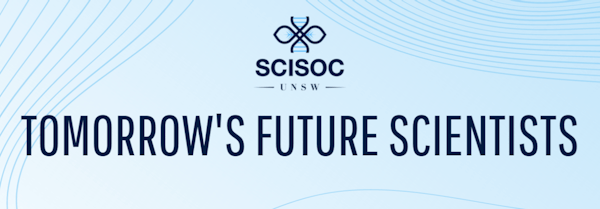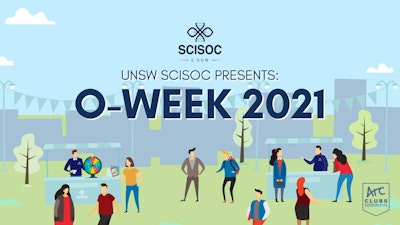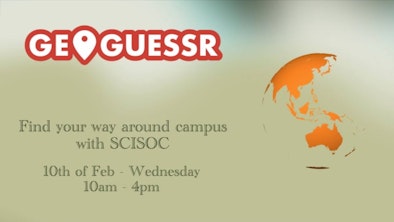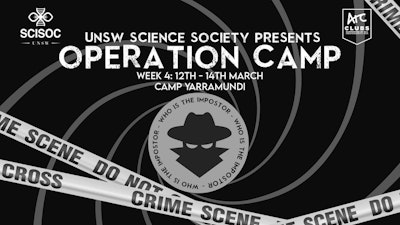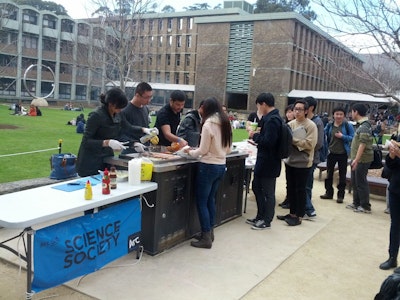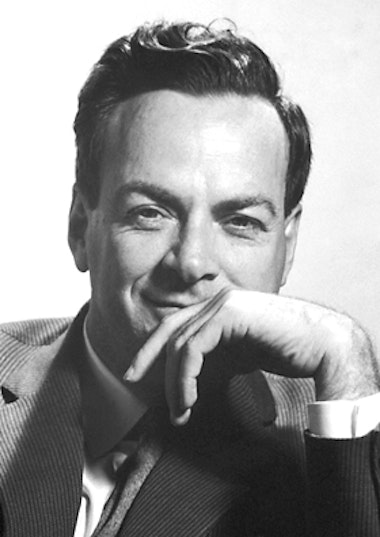Welcome back to PRISM, the SCISOC newsletter! In this newsletter, we're excited to announce a huge list of events we've got lined up in the next fortnight; from O-Week, to Zooper Dooper Day, and finally, our first flagship event of the year: Operation C.A.M.P! We also share a spotlight on Richard Feynman, a scientist we hold in high regard. Finally, in this fortnight's Fun Corner, we discuss ways to fix your sleep schedule in preparation for the start of a new year! Sit back, relax, and the SCISOC team wishes you good luck for the start of a new term! |
|
|
O-Week SCISOC will be at O-Week starting tomorrow (Monday, Wednesday and Thursday)! Come visit our stall located at Alumni West, to learn more about what we do, our events we have planned for this year, snag some freebies, and even win some prizes! Come along to find out how you can win a SCISOC wireless charger, polaroid camera, and even a tablet, and much more! Check out our Facebook event here. See you there! 8th - 11th February | All Day at UNSW |
| |
|
| O-Week Online Event: GeoGuessr
If you can't join us in person, we also have O-Week activities online on Wednesday 10th February! Hop onto our Discord here and join us for games of GeoGuessr to explore the UNSW campus virtually! There will also be prizes up for grabs such as: 1st: An O-Week Exclusive SCISOC T-Shirt
2nd, 3rd: A wireless charger! We hope to see you there! Wednesday 10th February | 10am - 4pm Discord |
|
|
UNSW SCISOC Presents: OPERATION C.A.M.P Our first flagship of the year, SCISOC Orientation Camp is here! Come along on this secret mission to have a weekend full of fun games, activities, and the opportunity to meet like-minded spies and operative, in order to thwart the impostors! Tickets will be released at 𝟗𝐀𝐌 𝐌𝐎𝐍𝐃𝐀𝐘 𝟖𝐓𝐇 𝐅𝐄𝐁 so be sure to secure your tickets quickly! Even better, join #OWeekWithSCISOC by going to our stall for a chance to win a FREE ticket! 𝙀𝘼𝙍𝙇𝙔-𝘽𝙄𝙍𝘿 𝙏𝙄𝘾𝙆𝙀𝙏𝙎 𝗔𝗥𝗖: $𝟮𝟭𝟱, 𝗡𝗼𝗻 𝗔𝗥𝗖: $𝟮𝟰𝟬 𝙂𝙀𝙉𝙀𝙍𝘼𝙇 𝙍𝙀𝙇𝙀𝘼𝙎𝙀 𝙏𝙄𝘾𝙆𝙀𝙏𝙎 𝗔𝗥𝗖: $𝟮𝟮𝟳, 𝗡𝗼𝗻 𝗔𝗥𝗖: $𝟮𝟱𝟬 Press GOING to receive updates on our Facebook event page here! 12th - 14th March | Camp Yarramundi |
| |
|
| Zooper Dooper Day As a very warm welcome back to uni from SCISOC, we invite you to our SCISOC meet & greet where we will be giving out FREE Zooper Doopers! If ice-cold Zooper Doopers on a hot summer's day is your vibe, come drop by and meet the committee for good bants and chats! 17th February 2021 | UNSW |
|
|
Richard Feynman, a Nobel Prize winner, a pioneer in the fields of quantum computing and nanotechnology, and arguably one of the greatest physicists of all time. Some things Feynman is known for are the path integral formulation of quantum mechanics, his work on the theory of quantum electrodynamics, and his development of Feynman diagrams, for which he won a Nobel Prize. He even assisted in the development of the atomic bomb in World War II. Yet, perhaps what he’s most remembered for, is his legendary ability to teach. |
| |
|
Feynman was an enthusiastic teacher who could capture the attention of all kinds of students, describing his own teaching style as “chaotic”. The idea of having a set method for teaching was flawed, in that a class contains many students with many different interests. For example, some students may be interested in the mathematics of a problem, while others may be more intrigued by its history and origins. So, to hook in every student, it’s important to include a bit of everything, or chaos, so to speak. Another issue Feynman had with how teaching was generally done, was the use of unnecessary jargon or complicated language. According to Feynman, technical language should be avoided until it is necessary, and most concepts should be explained in a simple way to the point where anyone could understand them. |
|
|
Feynman also had very interesting thoughts regarding the learning process. In fact, one of the most widely used learning methods, the Feynman technique, is based upon Feynman’s own method to learn a concept thoroughly. The technique works as follows: - Choose a concept you want to learn about.
- Write out everything you know about the concept as simply as possible as if you were trying to teach it to a child. Make sure you avoid using unnecessary jargon or complicated vocabulary.
- Review what you have written and identify the gaps in your knowledge, basically the things you would not be able to explain to a child simply.
- Go back to source material (lectures, textbooks etc.) and research some more to fill in those gaps.
- Repeat step 2 until you can explain the entire concept in a simple, uncomplicated way.
By wording your explanation in a simple way without the use of technical terms, it forces you to actually understand the deeper workings behind some concept, rather than just quoting some science term. One example that Feynman would give of this was explaining why shoes wear out after being used for a while. Majority of people would simply say “friction” as the reason. And while that is fundamentally true, it does not really explain it to someone who doesn’t know how it works. So, a much better explanation according to Feynman would be “shoe leather wears out because it rubs against the sidewalk and the little notches and bumps on the sidewalk grab pieces and pull them off.” This sort of explanation would be far easier for someone to understand, and it also guarantees that the explainer actually understands what’s going on behind friction. Using a similar approach to learning all sorts of concepts guarantees a proper understanding, rather than just memorising content. Feynman is often remembered as one of the greatest teachers of all time. Even Bill Gates gave his approval by posting a video on his YouTube account, “The best teacher I never had”, a tribute to Richard Feynman. His teaching style made the learning process far more interesting and enjoyable compared to how most people teach. So, for any teachers or aspiring teachers out there, be sure to take a page out of Feynman’s playbook when teaching. |
|
|
With O-Week starting tomorrow, the beginning of Term 1 follows closely behind, and with it will come the massive mountain of course work that we’re all dreading. In order to have a successful study period, one must prioritise their studying habits, as well as their general health, and this includes a good sleep schedule. After the two-month holiday students have just been given, this is probably something most are sorely lacking in (don’t lie to us. We know you were in bed watching TikToks for four hours straight after lying to your friends about going to sleep). So, in order to help guide you to a guaranteed successful study period, we decided to compile a short list of tips to improve your sleep schedule over the next week before the term starts! |
|
|
| 1. Sleep earlier every day Obviously, a bad sleep schedule can’t be fixed overnight. Everybody’s tried it before, and nobody’s ever been successful. However, with a bit of time, effort, and an iron will, it’s possible to slowly correct it over a period of time. Every night, try to go to bed just a bit earlier (no more than 15 minutes), and over a period of time, you should be able to push your sleep schedule back to an acceptable sleeping hour (and no, after midnight is not considered acceptable. Try harder). |
|
|
2. Keep your bedroom cool Your body prepares you for bedtime by lowering your body temperature, and so one of the most effective ways of getting quality sleep is to keep your bedroom at a certain temperature. A study done in 2012 by the National Institute of Health showed that the temperature of your bedroom was actually one of the most important factors that contributed to quality sleep. By keeping your bedroom at a range of 15 – 19oC, it’ll help your body feel a lot more comfortable and make it easier to fall asleep. If your bedroom is cooler than 12 oC, or warmer than 24 oC, it can actually disturb your sleep, so make sure you keep the temperature in your room at a level temperature! |
| |
|
| 3. Limit your naps One of the biggest impacts on bad sleep schedules is the occasional nap throughout the day. If you’re attempting to fix your sleep schedule, the best advice we can provide is not to nap, despite how tempting it might be. According to Rafael Pelayo, MD, a clinical professor at Stanford University, the best way to rid yourself of the urge to nap is a bit of light exercise. This is also the reason why you should avoid exercising before bedtime, as this has the added effect of keeping you more awake than you really should be at that hour. |
|
|
All in all, we hope these tips help you on your journey to improving your sleep schedule. Good luck with fixing your sleep schedule, as well as for the oncoming term! We’ll be trying these suggestions right alongside with you, so don’t be afraid to reach out and discuss your own sleeping tips and tricks! This article was finished at 5:27AM. |
|
|
UNSW Science Society is proud to announce our continued partnership with GradReady through 2020. GradReady provides GAMSAT Preparation courses for anyone looking to pursue Medicine after they graduate.
This process starts earlier than you think, so if you’re studying medical science or just have that passion, check out what they have to offer! |
|
|
| |
